Analyzing Leadership Development and its Influence at Cumberland Hotel
VerifiedAdded on 2021/01/02
|32
|8518
|401
Report
AI Summary
This report investigates the influence of leadership development on leaders, focusing on a case study of the Cumberland Hotel. It begins by defining leadership development and outlining its significance, followed by an examination of the leader development process and the factors affecting it. The research delves into the methodologies employed, including primary data collection methods such as interviews, and discusses their strengths and weaknesses. The literature review explores various leadership theories, including great man, trait, situational, and behavioral theories, highlighting the importance of training and development programs. The study aims to identify the ways in which Cumberland Hotel can enhance its leadership development strategies, ultimately contributing to the development of effective leaders within the organization. The report is structured to provide a comprehensive analysis of leadership development, incorporating both theoretical frameworks and practical insights from the hotel environment.
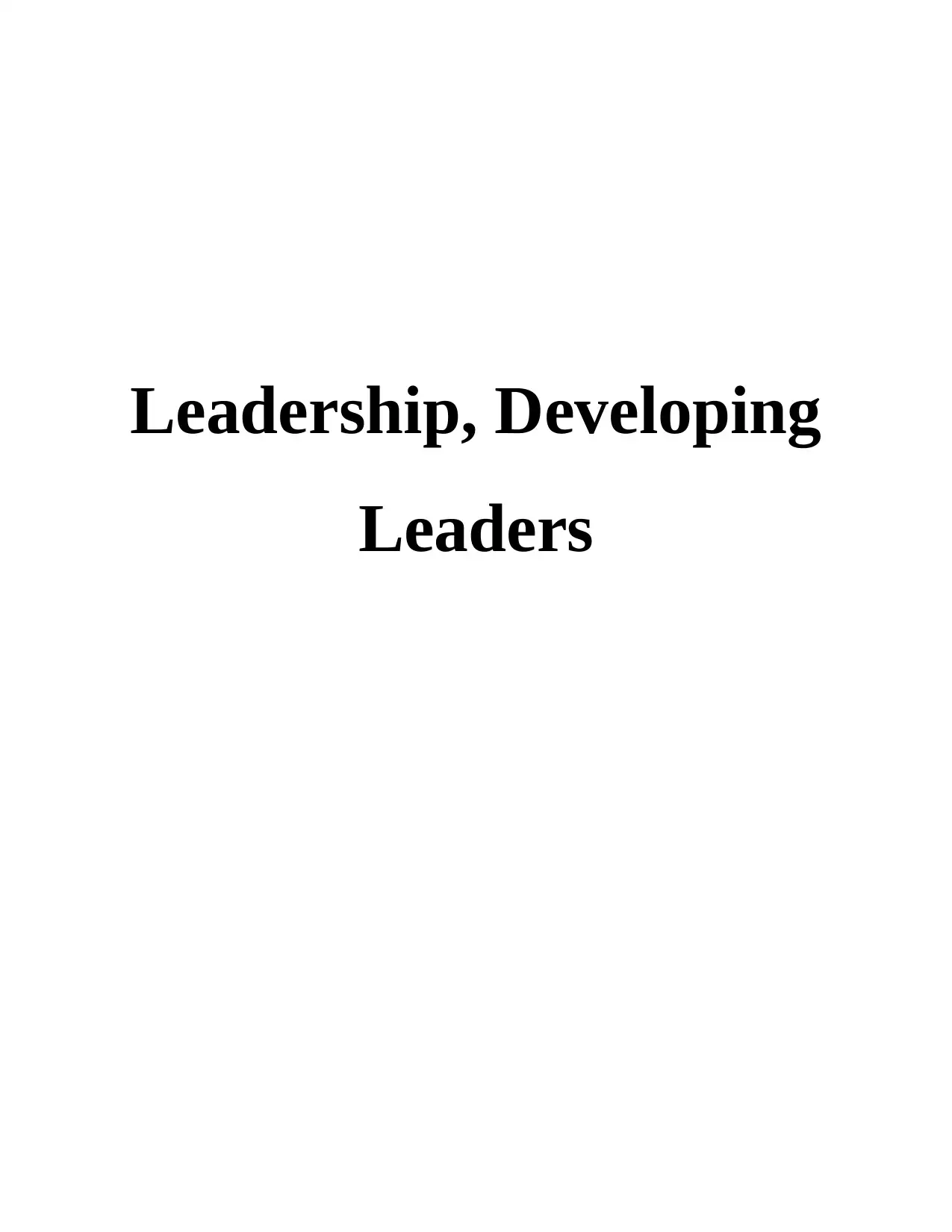
Leadership, Developing
Leaders
Leaders
Paraphrase This Document
Need a fresh take? Get an instant paraphrase of this document with our AI Paraphraser

TABLE OF CONTENTS
CHAPTER 1 ...................................................................................................................................3
INTRODUCTION ..........................................................................................................................3
1.1 Enquiry overview.............................................................................................................3
1.2 Aim and Objective of study ...........................................................................................4
1.3 Research questions ..........................................................................................................4
1.4 Background of the study ..................................................................................................5
1.5 Rationale of the study ......................................................................................................5
1.6 Scope of the study ...........................................................................................................5
1.7 Summary ..........................................................................................................................5
CHAPTER 2 ...................................................................................................................................6
2.1 Introduction ....................................................................................................................6
2.2 Conceptual clarifications .................................................................................................6
2.3 Concept as well as importance of leadership development .............................................7
2.4 Identify the procedure by which leaders are developed. .................................................8
2.5 Exploring the factors influencing leadership development .............................................9
2.6 The strategies which can be adopted by the manager in HOTEL for influencing leader to
develop more skills...............................................................................................................10
2.7 Summary.........................................................................................................................10
CHAPTER 3 .................................................................................................................................10
3.1 Introduction ..................................................................................................................10
3.2 Research paradigms .......................................................................................................11
3.3 Research approach ........................................................................................................11
3.4 Research strategy ...........................................................................................................12
3.5 Methods of data collection ............................................................................................12
3.6 Strengths of the methodologies ....................................................................................14
3.7 Weakness of the methodology ......................................................................................15
3.8 Summary ........................................................................................................................16
CHAPTER 1 ...................................................................................................................................3
INTRODUCTION ..........................................................................................................................3
1.1 Enquiry overview.............................................................................................................3
1.2 Aim and Objective of study ...........................................................................................4
1.3 Research questions ..........................................................................................................4
1.4 Background of the study ..................................................................................................5
1.5 Rationale of the study ......................................................................................................5
1.6 Scope of the study ...........................................................................................................5
1.7 Summary ..........................................................................................................................5
CHAPTER 2 ...................................................................................................................................6
2.1 Introduction ....................................................................................................................6
2.2 Conceptual clarifications .................................................................................................6
2.3 Concept as well as importance of leadership development .............................................7
2.4 Identify the procedure by which leaders are developed. .................................................8
2.5 Exploring the factors influencing leadership development .............................................9
2.6 The strategies which can be adopted by the manager in HOTEL for influencing leader to
develop more skills...............................................................................................................10
2.7 Summary.........................................................................................................................10
CHAPTER 3 .................................................................................................................................10
3.1 Introduction ..................................................................................................................10
3.2 Research paradigms .......................................................................................................11
3.3 Research approach ........................................................................................................11
3.4 Research strategy ...........................................................................................................12
3.5 Methods of data collection ............................................................................................12
3.6 Strengths of the methodologies ....................................................................................14
3.7 Weakness of the methodology ......................................................................................15
3.8 Summary ........................................................................................................................16

CHAPTER 4..................................................................................................................................16
4.1 Introduction ..................................................................................................................16
CHAPTER 5..................................................................................................................................27
Conclusion and recommendations .......................................................................................27
REFERENCES .............................................................................................................................29
4.1 Introduction ..................................................................................................................16
CHAPTER 5..................................................................................................................................27
Conclusion and recommendations .......................................................................................27
REFERENCES .............................................................................................................................29
⊘ This is a preview!⊘
Do you want full access?
Subscribe today to unlock all pages.

Trusted by 1+ million students worldwide
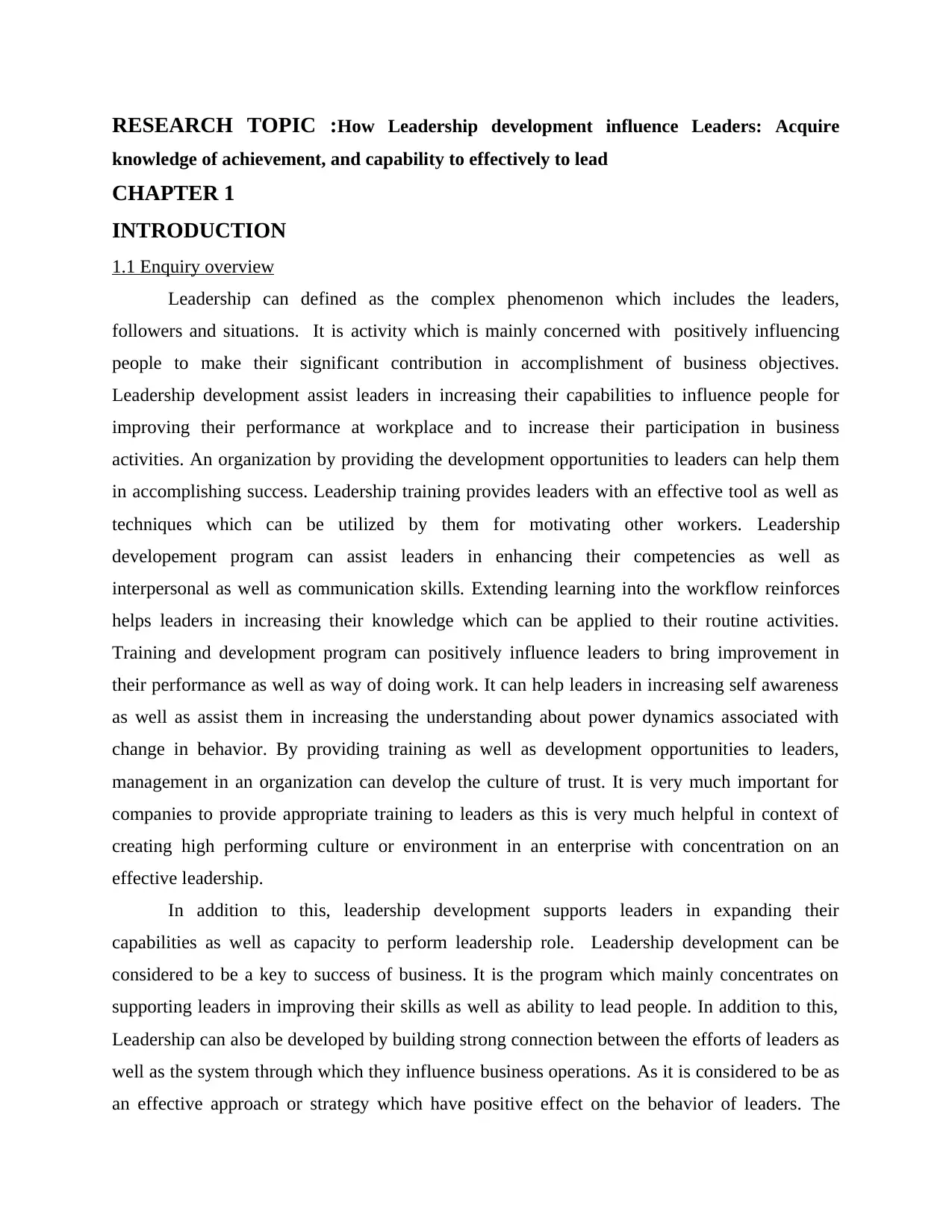
RESEARCH TOPIC :How Leadership development influence Leaders: Acquire
knowledge of achievement, and capability to effectively to lead
CHAPTER 1
INTRODUCTION
1.1 Enquiry overview
Leadership can defined as the complex phenomenon which includes the leaders,
followers and situations. It is activity which is mainly concerned with positively influencing
people to make their significant contribution in accomplishment of business objectives.
Leadership development assist leaders in increasing their capabilities to influence people for
improving their performance at workplace and to increase their participation in business
activities. An organization by providing the development opportunities to leaders can help them
in accomplishing success. Leadership training provides leaders with an effective tool as well as
techniques which can be utilized by them for motivating other workers. Leadership
developement program can assist leaders in enhancing their competencies as well as
interpersonal as well as communication skills. Extending learning into the workflow reinforces
helps leaders in increasing their knowledge which can be applied to their routine activities.
Training and development program can positively influence leaders to bring improvement in
their performance as well as way of doing work. It can help leaders in increasing self awareness
as well as assist them in increasing the understanding about power dynamics associated with
change in behavior. By providing training as well as development opportunities to leaders,
management in an organization can develop the culture of trust. It is very much important for
companies to provide appropriate training to leaders as this is very much helpful in context of
creating high performing culture or environment in an enterprise with concentration on an
effective leadership.
In addition to this, leadership development supports leaders in expanding their
capabilities as well as capacity to perform leadership role. Leadership development can be
considered to be a key to success of business. It is the program which mainly concentrates on
supporting leaders in improving their skills as well as ability to lead people. In addition to this,
Leadership can also be developed by building strong connection between the efforts of leaders as
well as the system through which they influence business operations. As it is considered to be as
an effective approach or strategy which have positive effect on the behavior of leaders. The
knowledge of achievement, and capability to effectively to lead
CHAPTER 1
INTRODUCTION
1.1 Enquiry overview
Leadership can defined as the complex phenomenon which includes the leaders,
followers and situations. It is activity which is mainly concerned with positively influencing
people to make their significant contribution in accomplishment of business objectives.
Leadership development assist leaders in increasing their capabilities to influence people for
improving their performance at workplace and to increase their participation in business
activities. An organization by providing the development opportunities to leaders can help them
in accomplishing success. Leadership training provides leaders with an effective tool as well as
techniques which can be utilized by them for motivating other workers. Leadership
developement program can assist leaders in enhancing their competencies as well as
interpersonal as well as communication skills. Extending learning into the workflow reinforces
helps leaders in increasing their knowledge which can be applied to their routine activities.
Training and development program can positively influence leaders to bring improvement in
their performance as well as way of doing work. It can help leaders in increasing self awareness
as well as assist them in increasing the understanding about power dynamics associated with
change in behavior. By providing training as well as development opportunities to leaders,
management in an organization can develop the culture of trust. It is very much important for
companies to provide appropriate training to leaders as this is very much helpful in context of
creating high performing culture or environment in an enterprise with concentration on an
effective leadership.
In addition to this, leadership development supports leaders in expanding their
capabilities as well as capacity to perform leadership role. Leadership development can be
considered to be a key to success of business. It is the program which mainly concentrates on
supporting leaders in improving their skills as well as ability to lead people. In addition to this,
Leadership can also be developed by building strong connection between the efforts of leaders as
well as the system through which they influence business operations. As it is considered to be as
an effective approach or strategy which have positive effect on the behavior of leaders. The
Paraphrase This Document
Need a fresh take? Get an instant paraphrase of this document with our AI Paraphraser
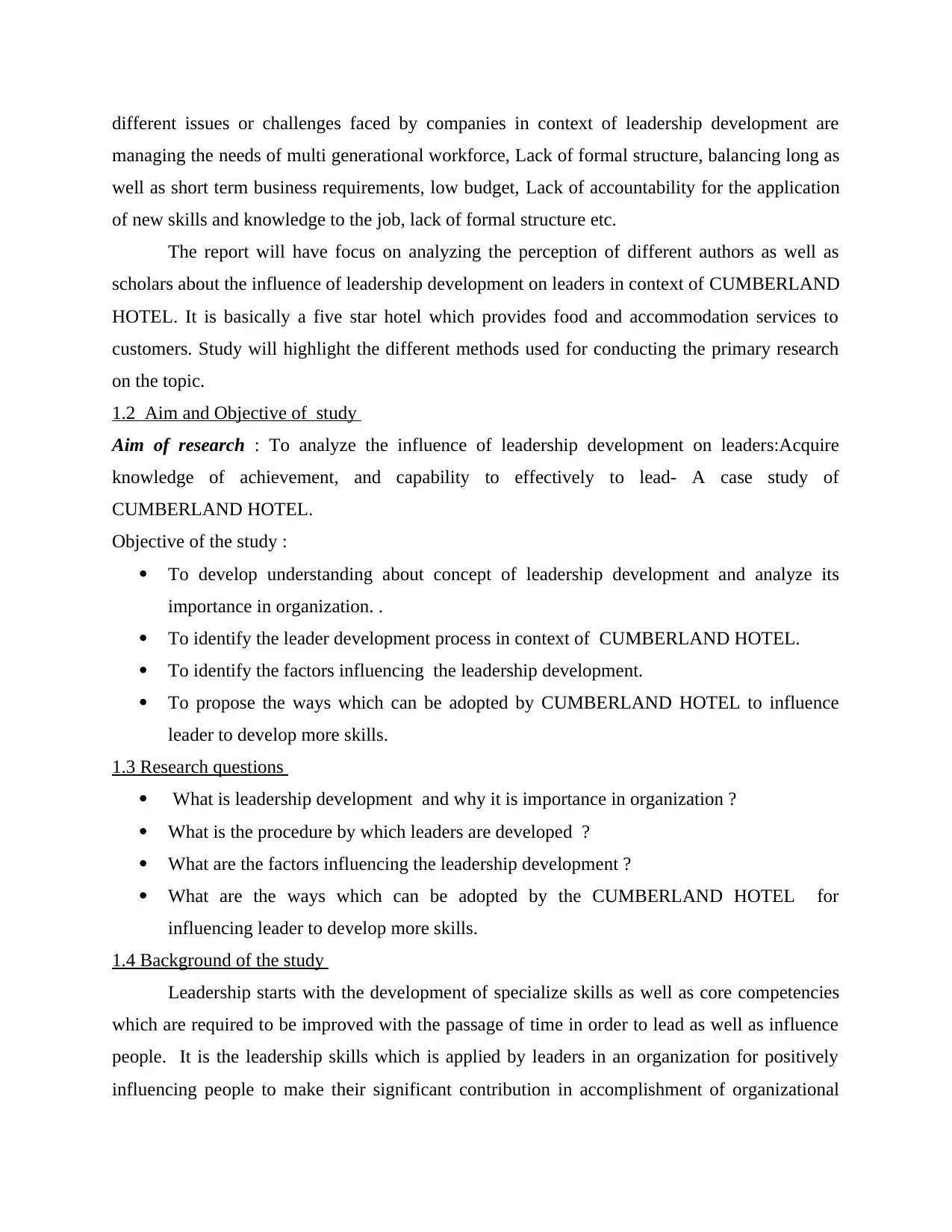
different issues or challenges faced by companies in context of leadership development are
managing the needs of multi generational workforce, Lack of formal structure, balancing long as
well as short term business requirements, low budget, Lack of accountability for the application
of new skills and knowledge to the job, lack of formal structure etc.
The report will have focus on analyzing the perception of different authors as well as
scholars about the influence of leadership development on leaders in context of CUMBERLAND
HOTEL. It is basically a five star hotel which provides food and accommodation services to
customers. Study will highlight the different methods used for conducting the primary research
on the topic.
1.2 Aim and Objective of study
Aim of research : To analyze the influence of leadership development on leaders:Acquire
knowledge of achievement, and capability to effectively to lead- A case study of
CUMBERLAND HOTEL.
Objective of the study :
To develop understanding about concept of leadership development and analyze its
importance in organization. .
To identify the leader development process in context of CUMBERLAND HOTEL.
To identify the factors influencing the leadership development.
To propose the ways which can be adopted by CUMBERLAND HOTEL to influence
leader to develop more skills.
1.3 Research questions
What is leadership development and why it is importance in organization ?
What is the procedure by which leaders are developed ?
What are the factors influencing the leadership development ?
What are the ways which can be adopted by the CUMBERLAND HOTEL for
influencing leader to develop more skills.
1.4 Background of the study
Leadership starts with the development of specialize skills as well as core competencies
which are required to be improved with the passage of time in order to lead as well as influence
people. It is the leadership skills which is applied by leaders in an organization for positively
influencing people to make their significant contribution in accomplishment of organizational
managing the needs of multi generational workforce, Lack of formal structure, balancing long as
well as short term business requirements, low budget, Lack of accountability for the application
of new skills and knowledge to the job, lack of formal structure etc.
The report will have focus on analyzing the perception of different authors as well as
scholars about the influence of leadership development on leaders in context of CUMBERLAND
HOTEL. It is basically a five star hotel which provides food and accommodation services to
customers. Study will highlight the different methods used for conducting the primary research
on the topic.
1.2 Aim and Objective of study
Aim of research : To analyze the influence of leadership development on leaders:Acquire
knowledge of achievement, and capability to effectively to lead- A case study of
CUMBERLAND HOTEL.
Objective of the study :
To develop understanding about concept of leadership development and analyze its
importance in organization. .
To identify the leader development process in context of CUMBERLAND HOTEL.
To identify the factors influencing the leadership development.
To propose the ways which can be adopted by CUMBERLAND HOTEL to influence
leader to develop more skills.
1.3 Research questions
What is leadership development and why it is importance in organization ?
What is the procedure by which leaders are developed ?
What are the factors influencing the leadership development ?
What are the ways which can be adopted by the CUMBERLAND HOTEL for
influencing leader to develop more skills.
1.4 Background of the study
Leadership starts with the development of specialize skills as well as core competencies
which are required to be improved with the passage of time in order to lead as well as influence
people. It is the leadership skills which is applied by leaders in an organization for positively
influencing people to make their significant contribution in accomplishment of organizational
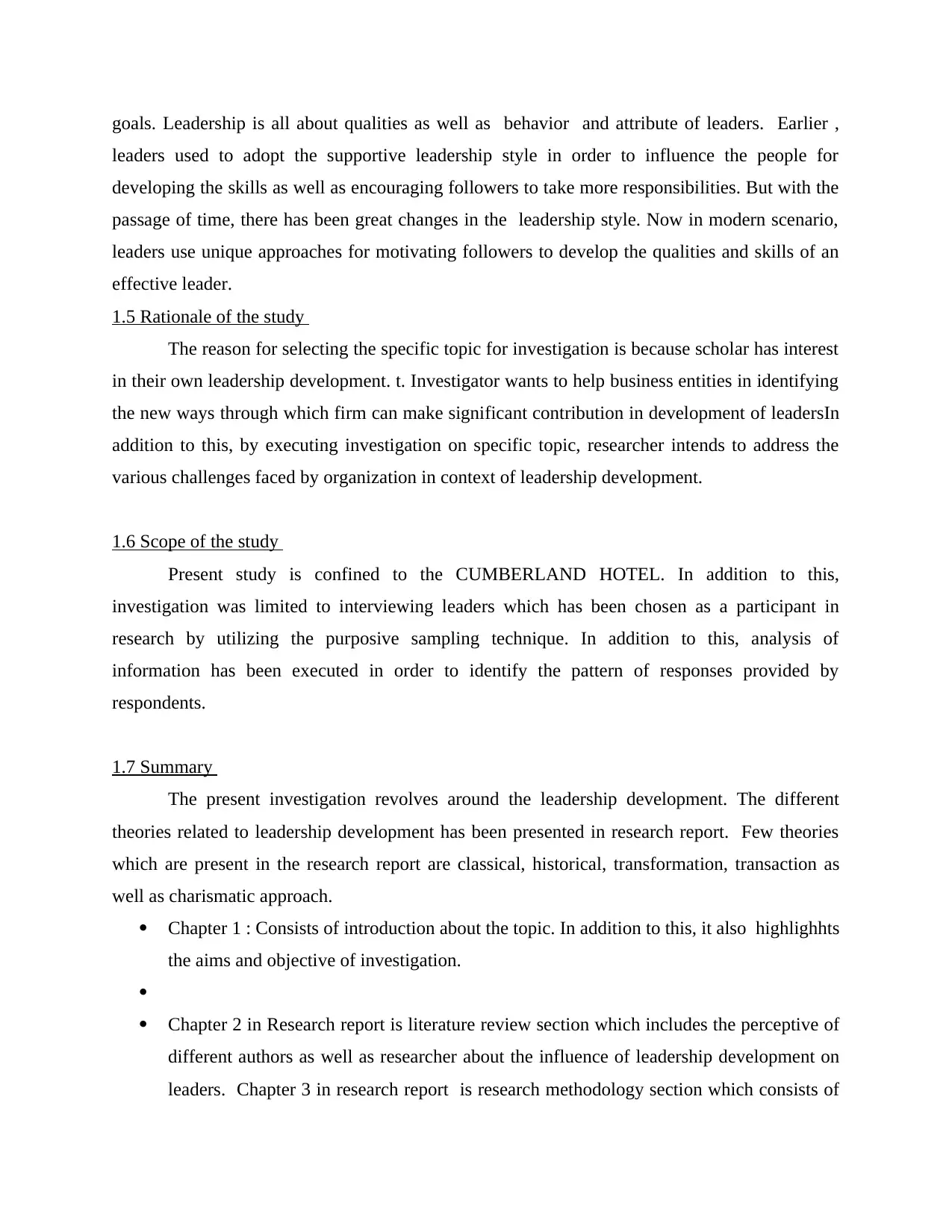
goals. Leadership is all about qualities as well as behavior and attribute of leaders. Earlier ,
leaders used to adopt the supportive leadership style in order to influence the people for
developing the skills as well as encouraging followers to take more responsibilities. But with the
passage of time, there has been great changes in the leadership style. Now in modern scenario,
leaders use unique approaches for motivating followers to develop the qualities and skills of an
effective leader.
1.5 Rationale of the study
The reason for selecting the specific topic for investigation is because scholar has interest
in their own leadership development. t. Investigator wants to help business entities in identifying
the new ways through which firm can make significant contribution in development of leadersIn
addition to this, by executing investigation on specific topic, researcher intends to address the
various challenges faced by organization in context of leadership development.
1.6 Scope of the study
Present study is confined to the CUMBERLAND HOTEL. In addition to this,
investigation was limited to interviewing leaders which has been chosen as a participant in
research by utilizing the purposive sampling technique. In addition to this, analysis of
information has been executed in order to identify the pattern of responses provided by
respondents.
1.7 Summary
The present investigation revolves around the leadership development. The different
theories related to leadership development has been presented in research report. Few theories
which are present in the research report are classical, historical, transformation, transaction as
well as charismatic approach.
Chapter 1 : Consists of introduction about the topic. In addition to this, it also highlighhts
the aims and objective of investigation.
Chapter 2 in Research report is literature review section which includes the perceptive of
different authors as well as researcher about the influence of leadership development on
leaders. Chapter 3 in research report is research methodology section which consists of
leaders used to adopt the supportive leadership style in order to influence the people for
developing the skills as well as encouraging followers to take more responsibilities. But with the
passage of time, there has been great changes in the leadership style. Now in modern scenario,
leaders use unique approaches for motivating followers to develop the qualities and skills of an
effective leader.
1.5 Rationale of the study
The reason for selecting the specific topic for investigation is because scholar has interest
in their own leadership development. t. Investigator wants to help business entities in identifying
the new ways through which firm can make significant contribution in development of leadersIn
addition to this, by executing investigation on specific topic, researcher intends to address the
various challenges faced by organization in context of leadership development.
1.6 Scope of the study
Present study is confined to the CUMBERLAND HOTEL. In addition to this,
investigation was limited to interviewing leaders which has been chosen as a participant in
research by utilizing the purposive sampling technique. In addition to this, analysis of
information has been executed in order to identify the pattern of responses provided by
respondents.
1.7 Summary
The present investigation revolves around the leadership development. The different
theories related to leadership development has been presented in research report. Few theories
which are present in the research report are classical, historical, transformation, transaction as
well as charismatic approach.
Chapter 1 : Consists of introduction about the topic. In addition to this, it also highlighhts
the aims and objective of investigation.
Chapter 2 in Research report is literature review section which includes the perceptive of
different authors as well as researcher about the influence of leadership development on
leaders. Chapter 3 in research report is research methodology section which consists of
⊘ This is a preview!⊘
Do you want full access?
Subscribe today to unlock all pages.

Trusted by 1+ million students worldwide
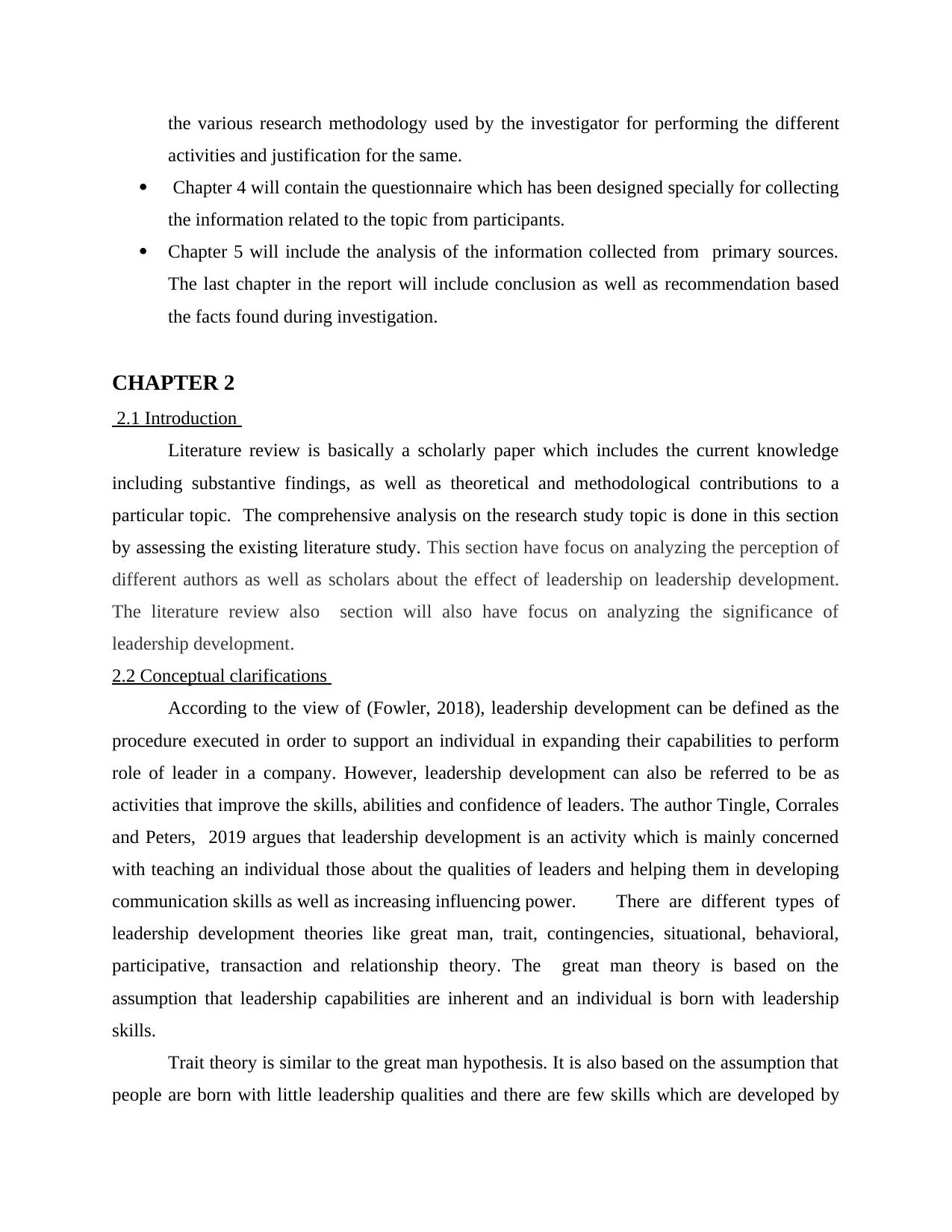
the various research methodology used by the investigator for performing the different
activities and justification for the same.
Chapter 4 will contain the questionnaire which has been designed specially for collecting
the information related to the topic from participants.
Chapter 5 will include the analysis of the information collected from primary sources.
The last chapter in the report will include conclusion as well as recommendation based
the facts found during investigation.
CHAPTER 2
2.1 Introduction
Literature review is basically a scholarly paper which includes the current knowledge
including substantive findings, as well as theoretical and methodological contributions to a
particular topic. The comprehensive analysis on the research study topic is done in this section
by assessing the existing literature study. This section have focus on analyzing the perception of
different authors as well as scholars about the effect of leadership on leadership development.
The literature review also section will also have focus on analyzing the significance of
leadership development.
2.2 Conceptual clarifications
According to the view of (Fowler, 2018), leadership development can be defined as the
procedure executed in order to support an individual in expanding their capabilities to perform
role of leader in a company. However, leadership development can also be referred to be as
activities that improve the skills, abilities and confidence of leaders. The author Tingle, Corrales
and Peters, 2019 argues that leadership development is an activity which is mainly concerned
with teaching an individual those about the qualities of leaders and helping them in developing
communication skills as well as increasing influencing power. There are different types of
leadership development theories like great man, trait, contingencies, situational, behavioral,
participative, transaction and relationship theory. The great man theory is based on the
assumption that leadership capabilities are inherent and an individual is born with leadership
skills.
Trait theory is similar to the great man hypothesis. It is also based on the assumption that
people are born with little leadership qualities and there are few skills which are developed by
activities and justification for the same.
Chapter 4 will contain the questionnaire which has been designed specially for collecting
the information related to the topic from participants.
Chapter 5 will include the analysis of the information collected from primary sources.
The last chapter in the report will include conclusion as well as recommendation based
the facts found during investigation.
CHAPTER 2
2.1 Introduction
Literature review is basically a scholarly paper which includes the current knowledge
including substantive findings, as well as theoretical and methodological contributions to a
particular topic. The comprehensive analysis on the research study topic is done in this section
by assessing the existing literature study. This section have focus on analyzing the perception of
different authors as well as scholars about the effect of leadership on leadership development.
The literature review also section will also have focus on analyzing the significance of
leadership development.
2.2 Conceptual clarifications
According to the view of (Fowler, 2018), leadership development can be defined as the
procedure executed in order to support an individual in expanding their capabilities to perform
role of leader in a company. However, leadership development can also be referred to be as
activities that improve the skills, abilities and confidence of leaders. The author Tingle, Corrales
and Peters, 2019 argues that leadership development is an activity which is mainly concerned
with teaching an individual those about the qualities of leaders and helping them in developing
communication skills as well as increasing influencing power. There are different types of
leadership development theories like great man, trait, contingencies, situational, behavioral,
participative, transaction and relationship theory. The great man theory is based on the
assumption that leadership capabilities are inherent and an individual is born with leadership
skills.
Trait theory is similar to the great man hypothesis. It is also based on the assumption that
people are born with little leadership qualities and there are few skills which are developed by
Paraphrase This Document
Need a fresh take? Get an instant paraphrase of this document with our AI Paraphraser
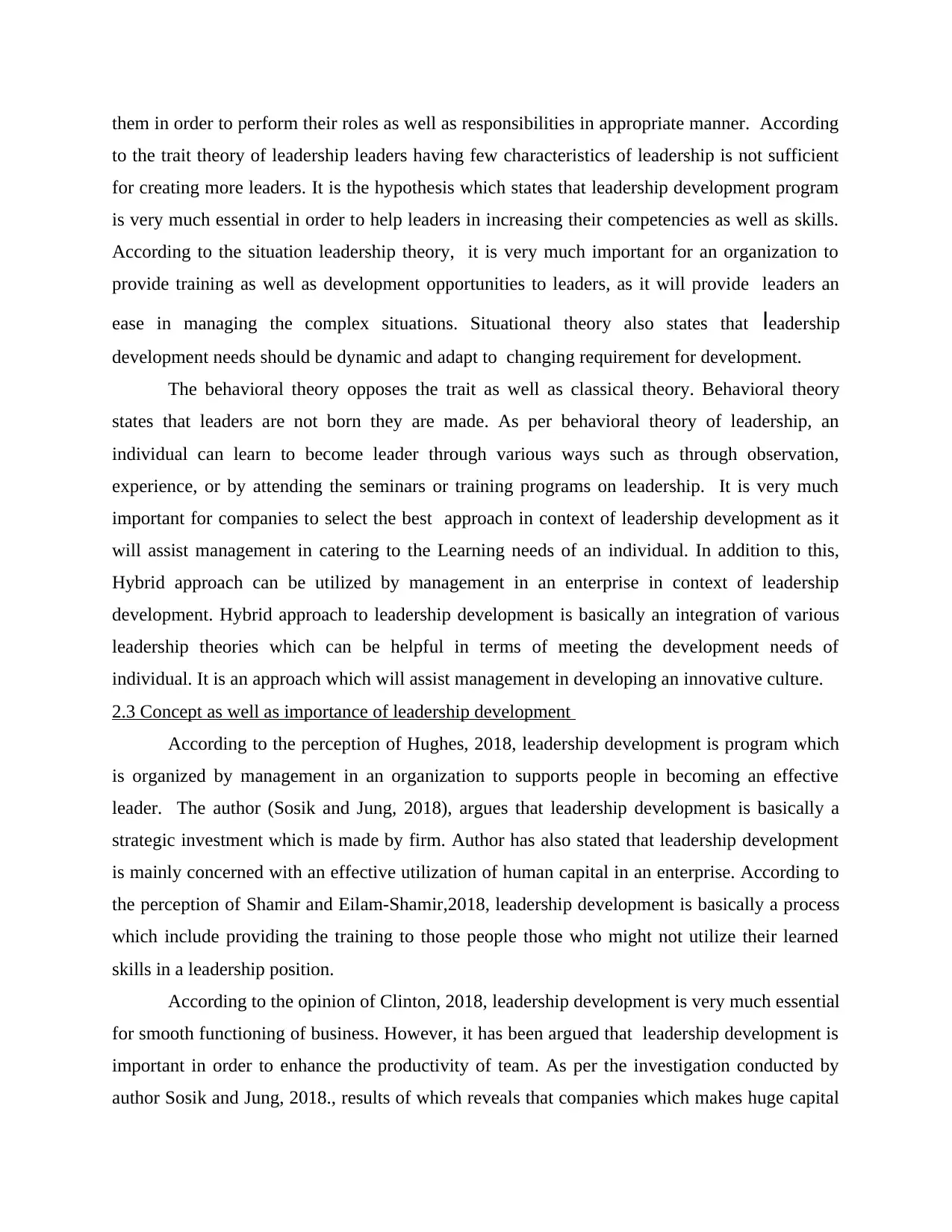
them in order to perform their roles as well as responsibilities in appropriate manner. According
to the trait theory of leadership leaders having few characteristics of leadership is not sufficient
for creating more leaders. It is the hypothesis which states that leadership development program
is very much essential in order to help leaders in increasing their competencies as well as skills.
According to the situation leadership theory, it is very much important for an organization to
provide training as well as development opportunities to leaders, as it will provide leaders an
ease in managing the complex situations. Situational theory also states that leadership
development needs should be dynamic and adapt to changing requirement for development.
The behavioral theory opposes the trait as well as classical theory. Behavioral theory
states that leaders are not born they are made. As per behavioral theory of leadership, an
individual can learn to become leader through various ways such as through observation,
experience, or by attending the seminars or training programs on leadership. It is very much
important for companies to select the best approach in context of leadership development as it
will assist management in catering to the Learning needs of an individual. In addition to this,
Hybrid approach can be utilized by management in an enterprise in context of leadership
development. Hybrid approach to leadership development is basically an integration of various
leadership theories which can be helpful in terms of meeting the development needs of
individual. It is an approach which will assist management in developing an innovative culture.
2.3 Concept as well as importance of leadership development
According to the perception of Hughes, 2018, leadership development is program which
is organized by management in an organization to supports people in becoming an effective
leader. The author (Sosik and Jung, 2018), argues that leadership development is basically a
strategic investment which is made by firm. Author has also stated that leadership development
is mainly concerned with an effective utilization of human capital in an enterprise. According to
the perception of Shamir and Eilam-Shamir,2018, leadership development is basically a process
which include providing the training to those people those who might not utilize their learned
skills in a leadership position.
According to the opinion of Clinton, 2018, leadership development is very much essential
for smooth functioning of business. However, it has been argued that leadership development is
important in order to enhance the productivity of team. As per the investigation conducted by
author Sosik and Jung, 2018., results of which reveals that companies which makes huge capital
to the trait theory of leadership leaders having few characteristics of leadership is not sufficient
for creating more leaders. It is the hypothesis which states that leadership development program
is very much essential in order to help leaders in increasing their competencies as well as skills.
According to the situation leadership theory, it is very much important for an organization to
provide training as well as development opportunities to leaders, as it will provide leaders an
ease in managing the complex situations. Situational theory also states that leadership
development needs should be dynamic and adapt to changing requirement for development.
The behavioral theory opposes the trait as well as classical theory. Behavioral theory
states that leaders are not born they are made. As per behavioral theory of leadership, an
individual can learn to become leader through various ways such as through observation,
experience, or by attending the seminars or training programs on leadership. It is very much
important for companies to select the best approach in context of leadership development as it
will assist management in catering to the Learning needs of an individual. In addition to this,
Hybrid approach can be utilized by management in an enterprise in context of leadership
development. Hybrid approach to leadership development is basically an integration of various
leadership theories which can be helpful in terms of meeting the development needs of
individual. It is an approach which will assist management in developing an innovative culture.
2.3 Concept as well as importance of leadership development
According to the perception of Hughes, 2018, leadership development is program which
is organized by management in an organization to supports people in becoming an effective
leader. The author (Sosik and Jung, 2018), argues that leadership development is basically a
strategic investment which is made by firm. Author has also stated that leadership development
is mainly concerned with an effective utilization of human capital in an enterprise. According to
the perception of Shamir and Eilam-Shamir,2018, leadership development is basically a process
which include providing the training to those people those who might not utilize their learned
skills in a leadership position.
According to the opinion of Clinton, 2018, leadership development is very much essential
for smooth functioning of business. However, it has been argued that leadership development is
important in order to enhance the productivity of team. As per the investigation conducted by
author Sosik and Jung, 2018., results of which reveals that companies which makes huge capital
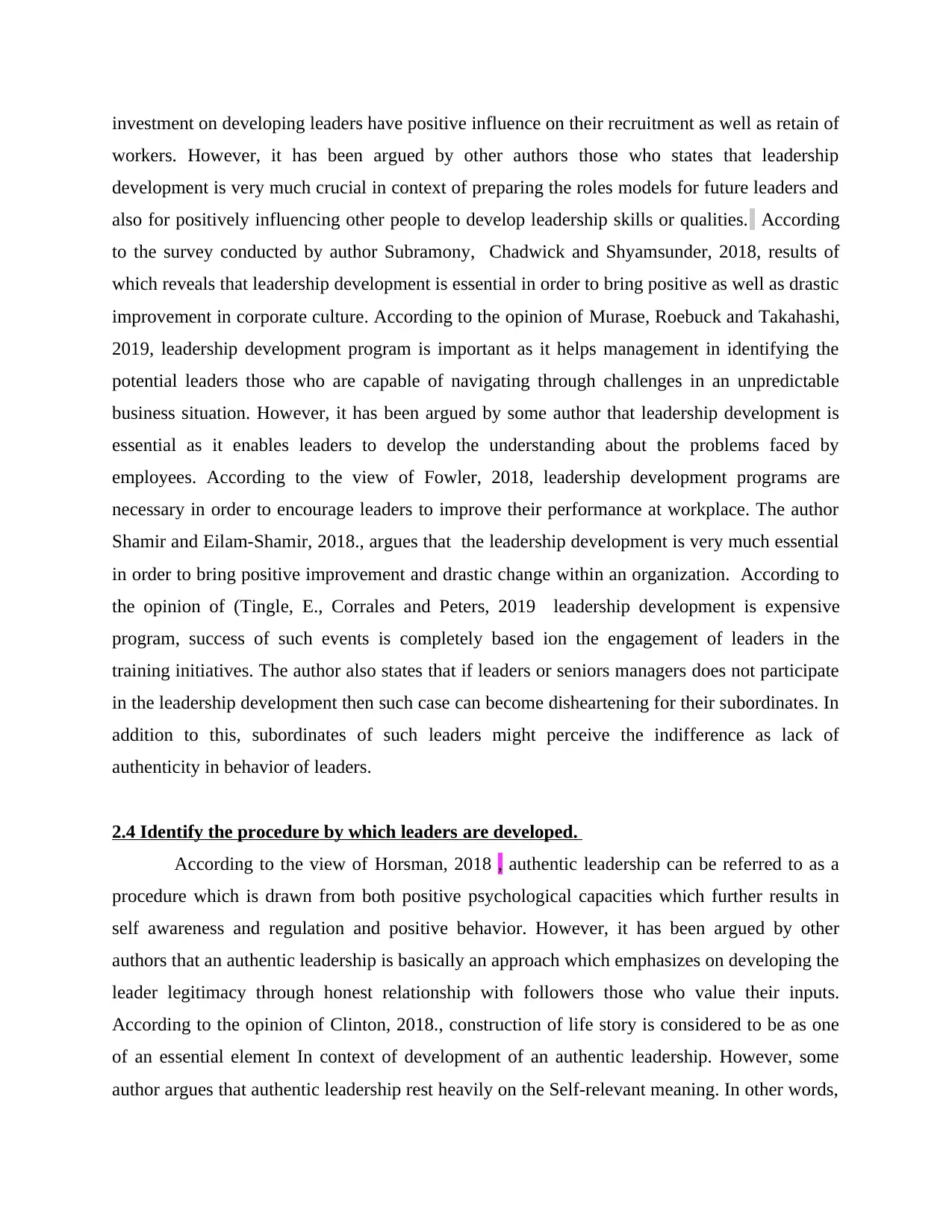
investment on developing leaders have positive influence on their recruitment as well as retain of
workers. However, it has been argued by other authors those who states that leadership
development is very much crucial in context of preparing the roles models for future leaders and
also for positively influencing other people to develop leadership skills or qualities. According
to the survey conducted by author Subramony, Chadwick and Shyamsunder, 2018, results of
which reveals that leadership development is essential in order to bring positive as well as drastic
improvement in corporate culture. According to the opinion of Murase, Roebuck and Takahashi,
2019, leadership development program is important as it helps management in identifying the
potential leaders those who are capable of navigating through challenges in an unpredictable
business situation. However, it has been argued by some author that leadership development is
essential as it enables leaders to develop the understanding about the problems faced by
employees. According to the view of Fowler, 2018, leadership development programs are
necessary in order to encourage leaders to improve their performance at workplace. The author
Shamir and Eilam-Shamir, 2018., argues that the leadership development is very much essential
in order to bring positive improvement and drastic change within an organization. According to
the opinion of (Tingle, E., Corrales and Peters, 2019 leadership development is expensive
program, success of such events is completely based ion the engagement of leaders in the
training initiatives. The author also states that if leaders or seniors managers does not participate
in the leadership development then such case can become disheartening for their subordinates. In
addition to this, subordinates of such leaders might perceive the indifference as lack of
authenticity in behavior of leaders.
2.4 Identify the procedure by which leaders are developed.
According to the view of Horsman, 2018 , authentic leadership can be referred to as a
procedure which is drawn from both positive psychological capacities which further results in
self awareness and regulation and positive behavior. However, it has been argued by other
authors that an authentic leadership is basically an approach which emphasizes on developing the
leader legitimacy through honest relationship with followers those who value their inputs.
According to the opinion of Clinton, 2018., construction of life story is considered to be as one
of an essential element In context of development of an authentic leadership. However, some
author argues that authentic leadership rest heavily on the Self-relevant meaning. In other words,
workers. However, it has been argued by other authors those who states that leadership
development is very much crucial in context of preparing the roles models for future leaders and
also for positively influencing other people to develop leadership skills or qualities. According
to the survey conducted by author Subramony, Chadwick and Shyamsunder, 2018, results of
which reveals that leadership development is essential in order to bring positive as well as drastic
improvement in corporate culture. According to the opinion of Murase, Roebuck and Takahashi,
2019, leadership development program is important as it helps management in identifying the
potential leaders those who are capable of navigating through challenges in an unpredictable
business situation. However, it has been argued by some author that leadership development is
essential as it enables leaders to develop the understanding about the problems faced by
employees. According to the view of Fowler, 2018, leadership development programs are
necessary in order to encourage leaders to improve their performance at workplace. The author
Shamir and Eilam-Shamir, 2018., argues that the leadership development is very much essential
in order to bring positive improvement and drastic change within an organization. According to
the opinion of (Tingle, E., Corrales and Peters, 2019 leadership development is expensive
program, success of such events is completely based ion the engagement of leaders in the
training initiatives. The author also states that if leaders or seniors managers does not participate
in the leadership development then such case can become disheartening for their subordinates. In
addition to this, subordinates of such leaders might perceive the indifference as lack of
authenticity in behavior of leaders.
2.4 Identify the procedure by which leaders are developed.
According to the view of Horsman, 2018 , authentic leadership can be referred to as a
procedure which is drawn from both positive psychological capacities which further results in
self awareness and regulation and positive behavior. However, it has been argued by other
authors that an authentic leadership is basically an approach which emphasizes on developing the
leader legitimacy through honest relationship with followers those who value their inputs.
According to the opinion of Clinton, 2018., construction of life story is considered to be as one
of an essential element In context of development of an authentic leadership. However, some
author argues that authentic leadership rest heavily on the Self-relevant meaning. In other words,
⊘ This is a preview!⊘
Do you want full access?
Subscribe today to unlock all pages.

Trusted by 1+ million students worldwide
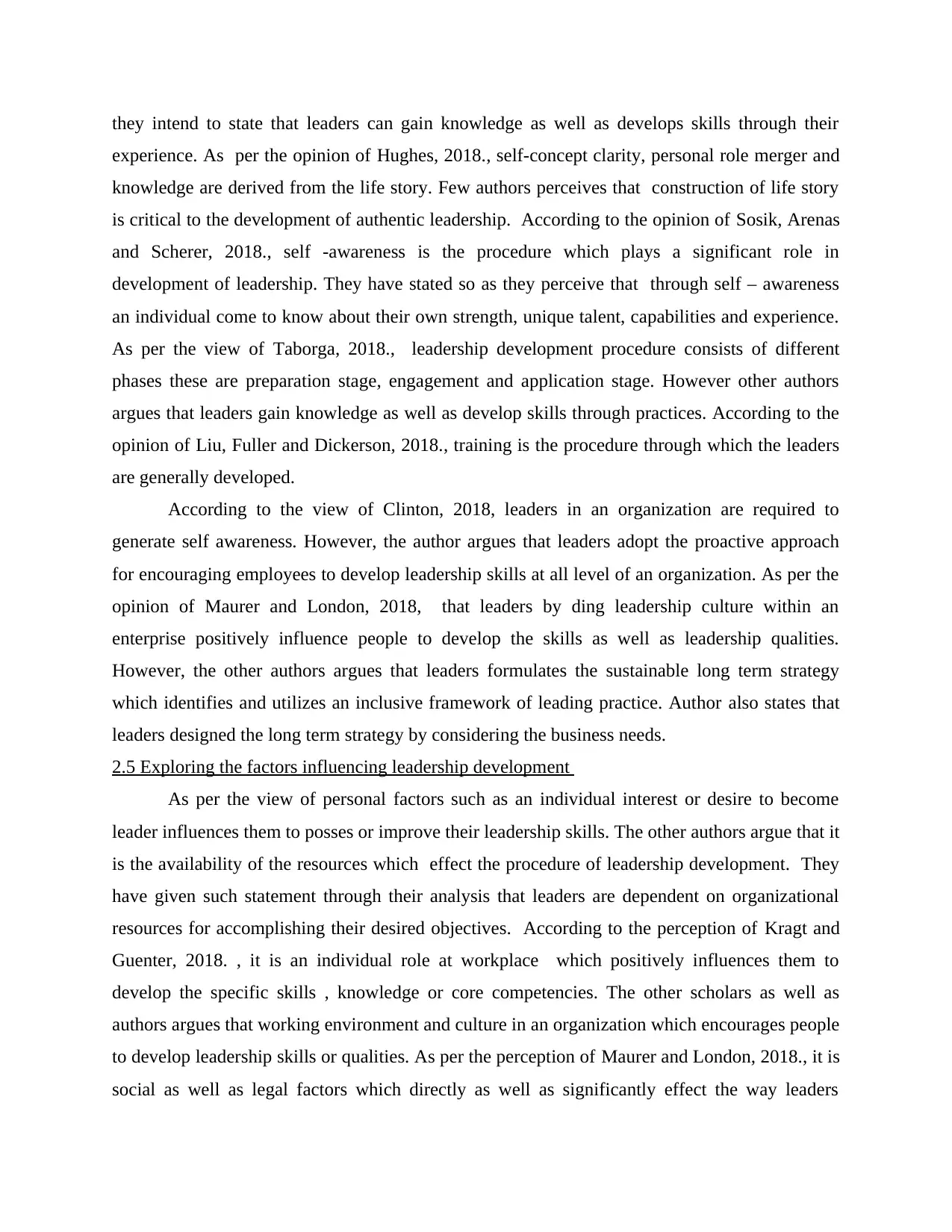
they intend to state that leaders can gain knowledge as well as develops skills through their
experience. As per the opinion of Hughes, 2018., self-concept clarity, personal role merger and
knowledge are derived from the life story. Few authors perceives that construction of life story
is critical to the development of authentic leadership. According to the opinion of Sosik, Arenas
and Scherer, 2018., self -awareness is the procedure which plays a significant role in
development of leadership. They have stated so as they perceive that through self – awareness
an individual come to know about their own strength, unique talent, capabilities and experience.
As per the view of Taborga, 2018., leadership development procedure consists of different
phases these are preparation stage, engagement and application stage. However other authors
argues that leaders gain knowledge as well as develop skills through practices. According to the
opinion of Liu, Fuller and Dickerson, 2018., training is the procedure through which the leaders
are generally developed.
According to the view of Clinton, 2018, leaders in an organization are required to
generate self awareness. However, the author argues that leaders adopt the proactive approach
for encouraging employees to develop leadership skills at all level of an organization. As per the
opinion of Maurer and London, 2018, that leaders by ding leadership culture within an
enterprise positively influence people to develop the skills as well as leadership qualities.
However, the other authors argues that leaders formulates the sustainable long term strategy
which identifies and utilizes an inclusive framework of leading practice. Author also states that
leaders designed the long term strategy by considering the business needs.
2.5 Exploring the factors influencing leadership development
As per the view of personal factors such as an individual interest or desire to become
leader influences them to posses or improve their leadership skills. The other authors argue that it
is the availability of the resources which effect the procedure of leadership development. They
have given such statement through their analysis that leaders are dependent on organizational
resources for accomplishing their desired objectives. According to the perception of Kragt and
Guenter, 2018. , it is an individual role at workplace which positively influences them to
develop the specific skills , knowledge or core competencies. The other scholars as well as
authors argues that working environment and culture in an organization which encourages people
to develop leadership skills or qualities. As per the perception of Maurer and London, 2018., it is
social as well as legal factors which directly as well as significantly effect the way leaders
experience. As per the opinion of Hughes, 2018., self-concept clarity, personal role merger and
knowledge are derived from the life story. Few authors perceives that construction of life story
is critical to the development of authentic leadership. According to the opinion of Sosik, Arenas
and Scherer, 2018., self -awareness is the procedure which plays a significant role in
development of leadership. They have stated so as they perceive that through self – awareness
an individual come to know about their own strength, unique talent, capabilities and experience.
As per the view of Taborga, 2018., leadership development procedure consists of different
phases these are preparation stage, engagement and application stage. However other authors
argues that leaders gain knowledge as well as develop skills through practices. According to the
opinion of Liu, Fuller and Dickerson, 2018., training is the procedure through which the leaders
are generally developed.
According to the view of Clinton, 2018, leaders in an organization are required to
generate self awareness. However, the author argues that leaders adopt the proactive approach
for encouraging employees to develop leadership skills at all level of an organization. As per the
opinion of Maurer and London, 2018, that leaders by ding leadership culture within an
enterprise positively influence people to develop the skills as well as leadership qualities.
However, the other authors argues that leaders formulates the sustainable long term strategy
which identifies and utilizes an inclusive framework of leading practice. Author also states that
leaders designed the long term strategy by considering the business needs.
2.5 Exploring the factors influencing leadership development
As per the view of personal factors such as an individual interest or desire to become
leader influences them to posses or improve their leadership skills. The other authors argue that it
is the availability of the resources which effect the procedure of leadership development. They
have given such statement through their analysis that leaders are dependent on organizational
resources for accomplishing their desired objectives. According to the perception of Kragt and
Guenter, 2018. , it is an individual role at workplace which positively influences them to
develop the specific skills , knowledge or core competencies. The other scholars as well as
authors argues that working environment and culture in an organization which encourages people
to develop leadership skills or qualities. As per the perception of Maurer and London, 2018., it is
social as well as legal factors which directly as well as significantly effect the way leaders
Paraphrase This Document
Need a fresh take? Get an instant paraphrase of this document with our AI Paraphraser
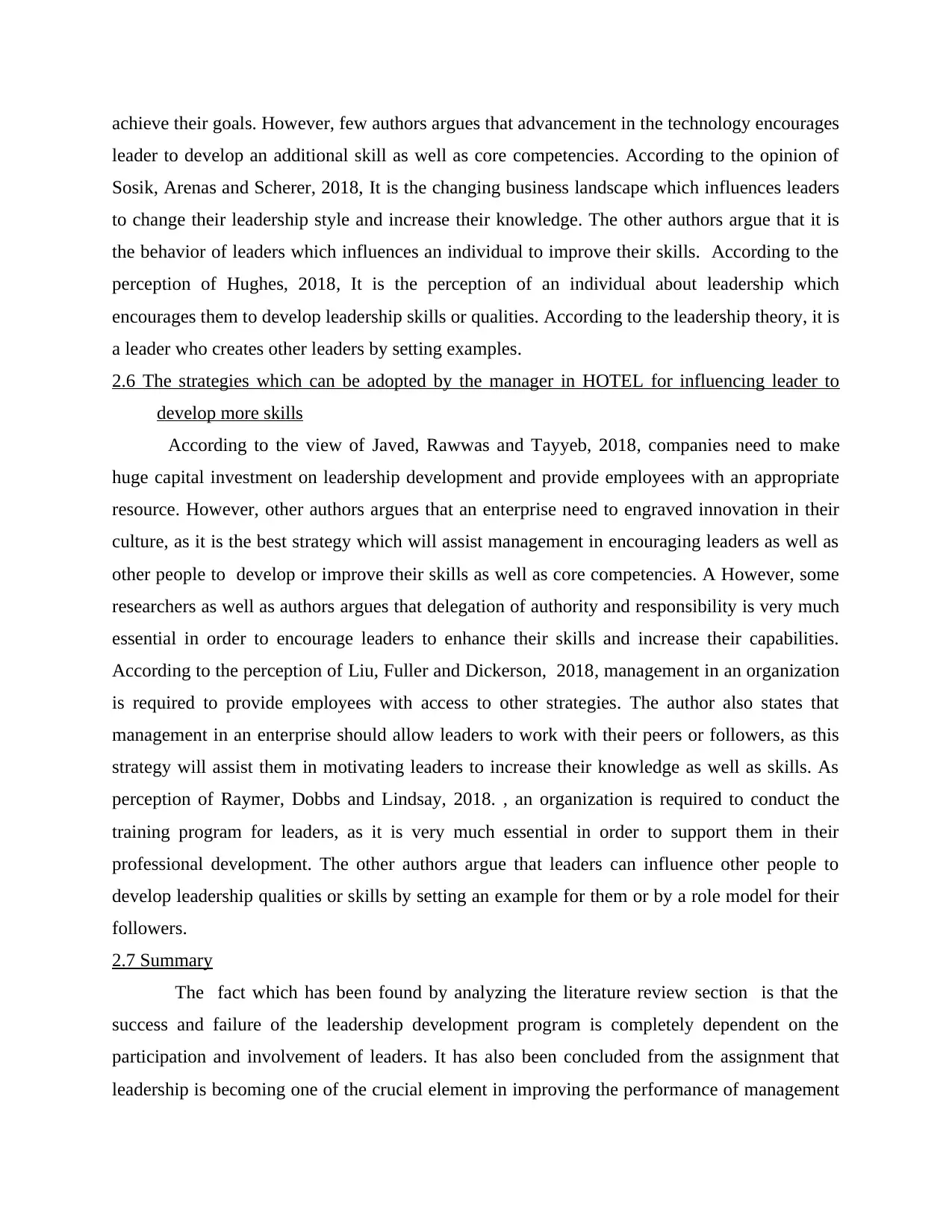
achieve their goals. However, few authors argues that advancement in the technology encourages
leader to develop an additional skill as well as core competencies. According to the opinion of
Sosik, Arenas and Scherer, 2018, It is the changing business landscape which influences leaders
to change their leadership style and increase their knowledge. The other authors argue that it is
the behavior of leaders which influences an individual to improve their skills. According to the
perception of Hughes, 2018, It is the perception of an individual about leadership which
encourages them to develop leadership skills or qualities. According to the leadership theory, it is
a leader who creates other leaders by setting examples.
2.6 The strategies which can be adopted by the manager in HOTEL for influencing leader to
develop more skills
According to the view of Javed, Rawwas and Tayyeb, 2018, companies need to make
huge capital investment on leadership development and provide employees with an appropriate
resource. However, other authors argues that an enterprise need to engraved innovation in their
culture, as it is the best strategy which will assist management in encouraging leaders as well as
other people to develop or improve their skills as well as core competencies. A However, some
researchers as well as authors argues that delegation of authority and responsibility is very much
essential in order to encourage leaders to enhance their skills and increase their capabilities.
According to the perception of Liu, Fuller and Dickerson, 2018, management in an organization
is required to provide employees with access to other strategies. The author also states that
management in an enterprise should allow leaders to work with their peers or followers, as this
strategy will assist them in motivating leaders to increase their knowledge as well as skills. As
perception of Raymer, Dobbs and Lindsay, 2018. , an organization is required to conduct the
training program for leaders, as it is very much essential in order to support them in their
professional development. The other authors argue that leaders can influence other people to
develop leadership qualities or skills by setting an example for them or by a role model for their
followers.
2.7 Summary
The fact which has been found by analyzing the literature review section is that the
success and failure of the leadership development program is completely dependent on the
participation and involvement of leaders. It has also been concluded from the assignment that
leadership is becoming one of the crucial element in improving the performance of management
leader to develop an additional skill as well as core competencies. According to the opinion of
Sosik, Arenas and Scherer, 2018, It is the changing business landscape which influences leaders
to change their leadership style and increase their knowledge. The other authors argue that it is
the behavior of leaders which influences an individual to improve their skills. According to the
perception of Hughes, 2018, It is the perception of an individual about leadership which
encourages them to develop leadership skills or qualities. According to the leadership theory, it is
a leader who creates other leaders by setting examples.
2.6 The strategies which can be adopted by the manager in HOTEL for influencing leader to
develop more skills
According to the view of Javed, Rawwas and Tayyeb, 2018, companies need to make
huge capital investment on leadership development and provide employees with an appropriate
resource. However, other authors argues that an enterprise need to engraved innovation in their
culture, as it is the best strategy which will assist management in encouraging leaders as well as
other people to develop or improve their skills as well as core competencies. A However, some
researchers as well as authors argues that delegation of authority and responsibility is very much
essential in order to encourage leaders to enhance their skills and increase their capabilities.
According to the perception of Liu, Fuller and Dickerson, 2018, management in an organization
is required to provide employees with access to other strategies. The author also states that
management in an enterprise should allow leaders to work with their peers or followers, as this
strategy will assist them in motivating leaders to increase their knowledge as well as skills. As
perception of Raymer, Dobbs and Lindsay, 2018. , an organization is required to conduct the
training program for leaders, as it is very much essential in order to support them in their
professional development. The other authors argue that leaders can influence other people to
develop leadership qualities or skills by setting an example for them or by a role model for their
followers.
2.7 Summary
The fact which has been found by analyzing the literature review section is that the
success and failure of the leadership development program is completely dependent on the
participation and involvement of leaders. It has also been concluded from the assignment that
leadership is becoming one of the crucial element in improving the performance of management
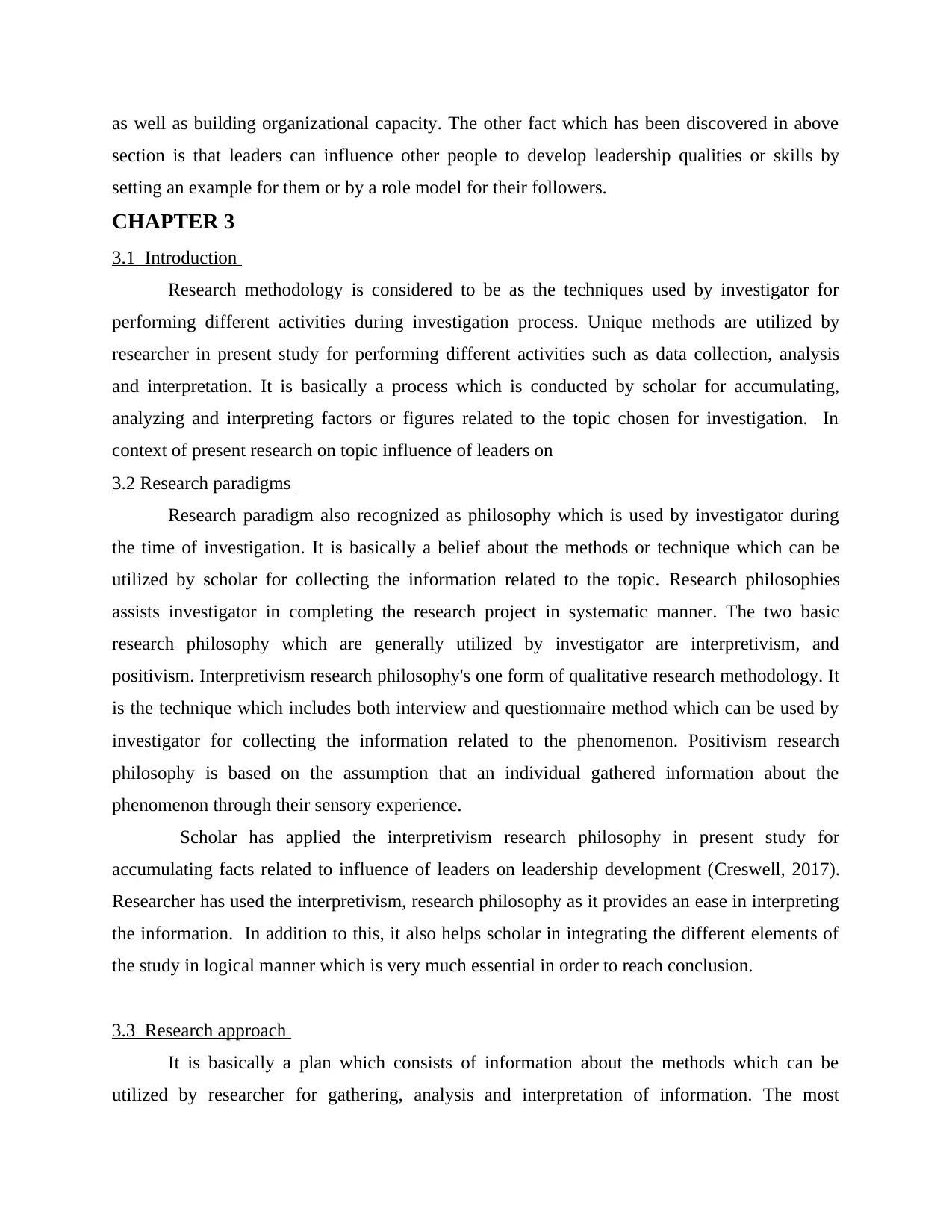
as well as building organizational capacity. The other fact which has been discovered in above
section is that leaders can influence other people to develop leadership qualities or skills by
setting an example for them or by a role model for their followers.
CHAPTER 3
3.1 Introduction
Research methodology is considered to be as the techniques used by investigator for
performing different activities during investigation process. Unique methods are utilized by
researcher in present study for performing different activities such as data collection, analysis
and interpretation. It is basically a process which is conducted by scholar for accumulating,
analyzing and interpreting factors or figures related to the topic chosen for investigation. In
context of present research on topic influence of leaders on
3.2 Research paradigms
Research paradigm also recognized as philosophy which is used by investigator during
the time of investigation. It is basically a belief about the methods or technique which can be
utilized by scholar for collecting the information related to the topic. Research philosophies
assists investigator in completing the research project in systematic manner. The two basic
research philosophy which are generally utilized by investigator are interpretivism, and
positivism. Interpretivism research philosophy's one form of qualitative research methodology. It
is the technique which includes both interview and questionnaire method which can be used by
investigator for collecting the information related to the phenomenon. Positivism research
philosophy is based on the assumption that an individual gathered information about the
phenomenon through their sensory experience.
Scholar has applied the interpretivism research philosophy in present study for
accumulating facts related to influence of leaders on leadership development (Creswell, 2017).
Researcher has used the interpretivism, research philosophy as it provides an ease in interpreting
the information. In addition to this, it also helps scholar in integrating the different elements of
the study in logical manner which is very much essential in order to reach conclusion.
3.3 Research approach
It is basically a plan which consists of information about the methods which can be
utilized by researcher for gathering, analysis and interpretation of information. The most
section is that leaders can influence other people to develop leadership qualities or skills by
setting an example for them or by a role model for their followers.
CHAPTER 3
3.1 Introduction
Research methodology is considered to be as the techniques used by investigator for
performing different activities during investigation process. Unique methods are utilized by
researcher in present study for performing different activities such as data collection, analysis
and interpretation. It is basically a process which is conducted by scholar for accumulating,
analyzing and interpreting factors or figures related to the topic chosen for investigation. In
context of present research on topic influence of leaders on
3.2 Research paradigms
Research paradigm also recognized as philosophy which is used by investigator during
the time of investigation. It is basically a belief about the methods or technique which can be
utilized by scholar for collecting the information related to the topic. Research philosophies
assists investigator in completing the research project in systematic manner. The two basic
research philosophy which are generally utilized by investigator are interpretivism, and
positivism. Interpretivism research philosophy's one form of qualitative research methodology. It
is the technique which includes both interview and questionnaire method which can be used by
investigator for collecting the information related to the phenomenon. Positivism research
philosophy is based on the assumption that an individual gathered information about the
phenomenon through their sensory experience.
Scholar has applied the interpretivism research philosophy in present study for
accumulating facts related to influence of leaders on leadership development (Creswell, 2017).
Researcher has used the interpretivism, research philosophy as it provides an ease in interpreting
the information. In addition to this, it also helps scholar in integrating the different elements of
the study in logical manner which is very much essential in order to reach conclusion.
3.3 Research approach
It is basically a plan which consists of information about the methods which can be
utilized by researcher for gathering, analysis and interpretation of information. The most
⊘ This is a preview!⊘
Do you want full access?
Subscribe today to unlock all pages.

Trusted by 1+ million students worldwide
1 out of 32
Related Documents
Your All-in-One AI-Powered Toolkit for Academic Success.
+13062052269
info@desklib.com
Available 24*7 on WhatsApp / Email
![[object Object]](/_next/static/media/star-bottom.7253800d.svg)
Unlock your academic potential
Copyright © 2020–2026 A2Z Services. All Rights Reserved. Developed and managed by ZUCOL.





